The Scientific Method Reading Answers
7 min read
Updated On
-
Copy link
Table of Contents

Limited-Time Offer : Access a FREE 10-Day IELTS Study Plan!
Reading Passage
The Academic passage ‘The Scientific Method’ is a reading passage that appeared in an IELTS Test. Ideally, you should not spend more than 20 minutes on a passage. Let’s see how easy this passage is for you and if you’re able to make it in 20 minutes. If not, try more IELTS reading practice test from IELTSMaterial.com.
The question types found in this passage are:
Matching Headings
The matching headings type of questions in the IELTS reading test requires the test-taker to match paragraph headings to the paragraphs in the reading text. The matching heading type of questions assesses the test-taker’s ability to understand the main theme of the passage and match the headings correctly.
Matching Information
The matching information type of questions in the IELTS reading test is very common which requires the test-taker to match the information that is contained in different paragraphs according to the question statements. The test-taker should possess excellent paraphrasing skills to attempt this type of question.
Yes/No/Not Given
The Yes/No/Not Given the type of questions in the IELTS reading test is similar to the True/False/Not Given type of questions, where the test-taker should read the statement and go through the information in the passage to check whether the statement agrees or disagrees or contradicts or is not mentioned in the reading passage. Write Yes, if the statement agrees with the information, write No, if the statement contradicts, and write Not Given if there’s no reference for the statement.
Short Answer Questions
The short answer questions in the IELTS reading test assess the test-taker’s ability to identify the paraphrasing and synonyms of the specific word in the reading passage and write it according to the question asked. The test-taker should not write more than the number of words specified in the instruction.
The Scientific Method
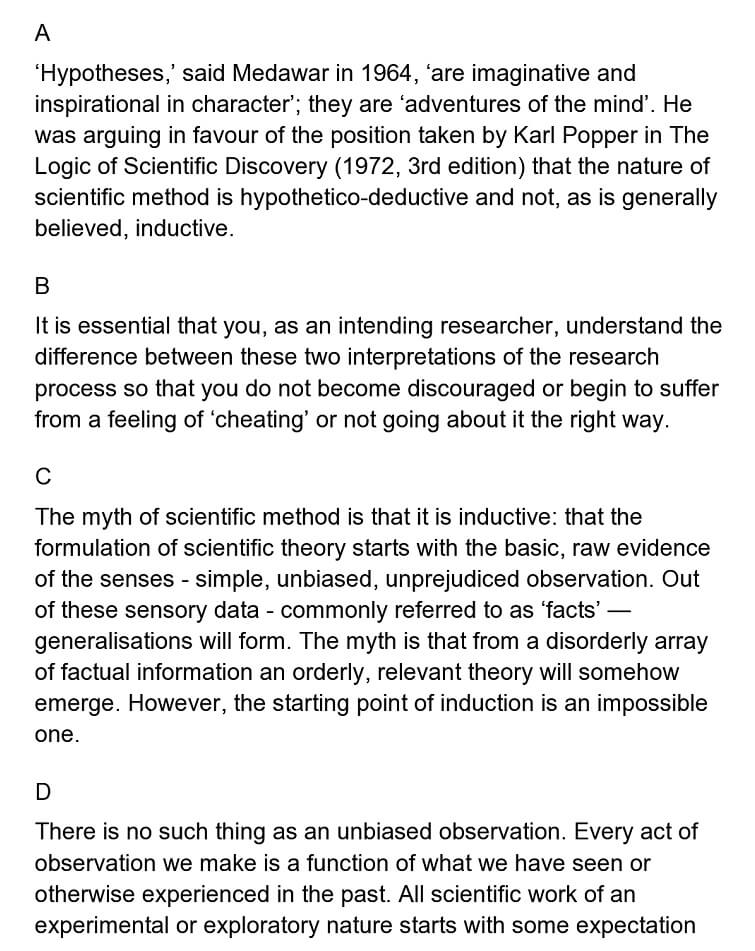
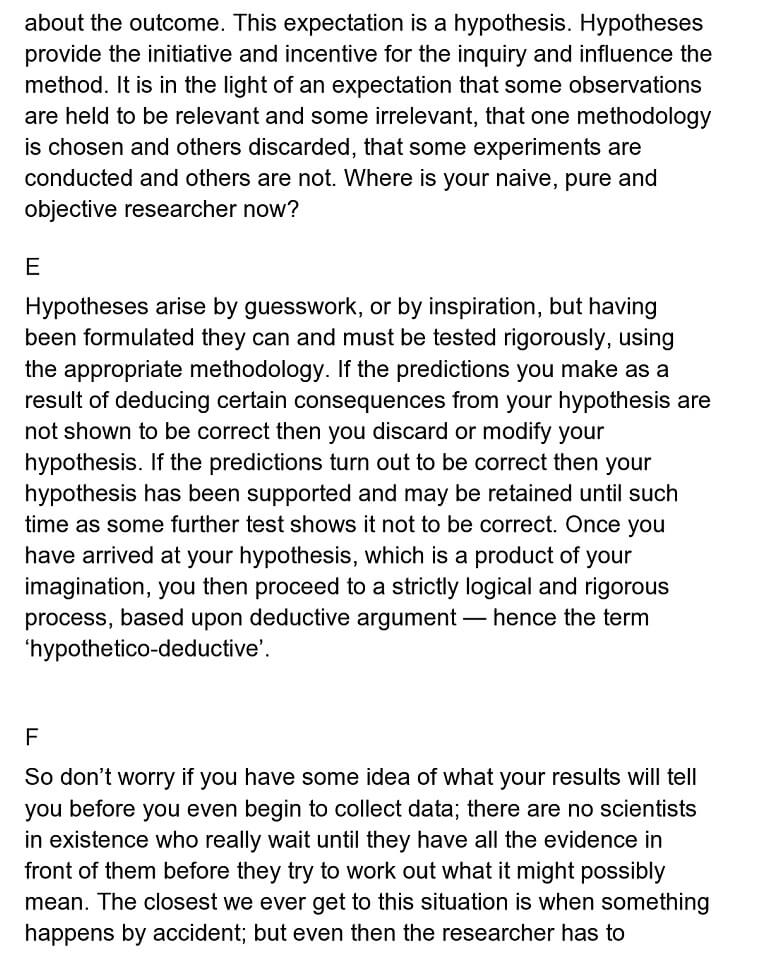
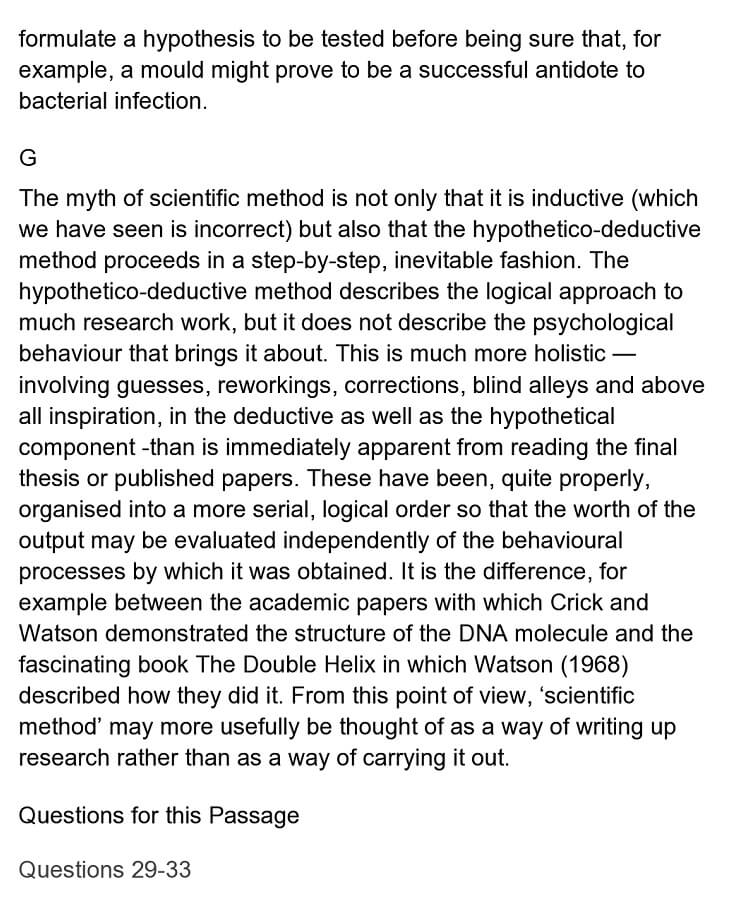
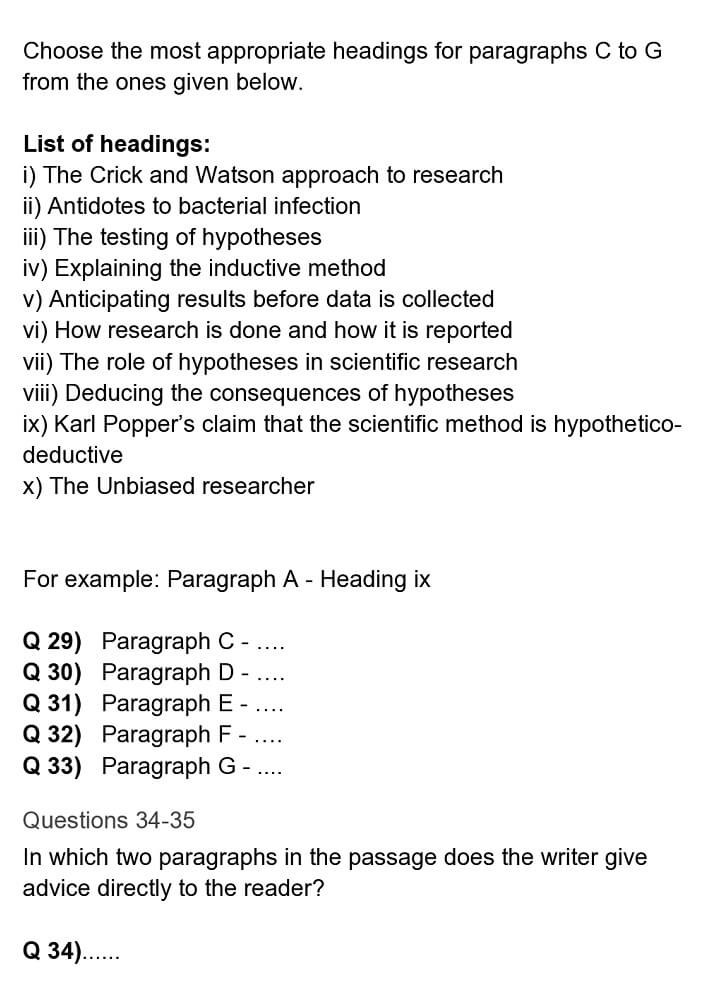
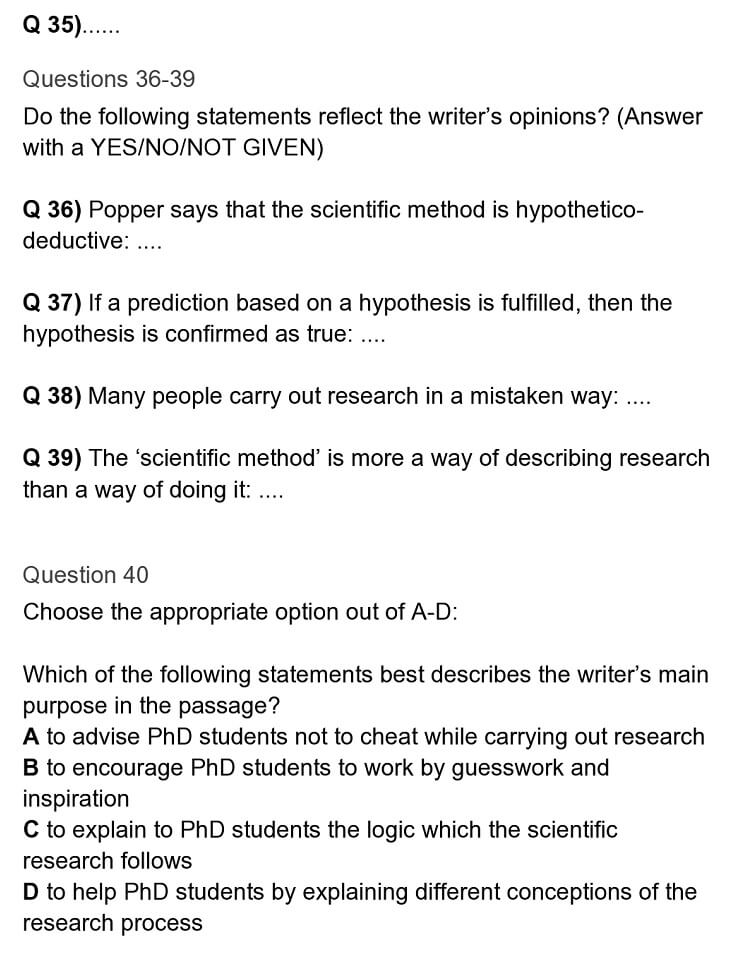
Answers
Unlock Answers
29 Answer: iv
Question type: Matching Heading
Answer locations: Paragraph C
Answer explanations: Paragraph C states that the myth of ‘scientific method’ is that it is ‘inductive’. It means that the ‘formulation of scientific theory starts with the basic, raw evidence of the senses’, that is, simple, unbiased, unprejudiced ‘observation’. Hence, the answer is iv (Explaining the inductive method).
30 Answer: vii
Question type: Matching Heading
Answer locations: Paragraph D
Answer explanations: Paragraph D provides how hypotheses are helpful to science. They ‘provide the initiative and incentive for the inquiry’ and ‘influence the method’ (role of hypotheses). Hence, the answer is vii (The role of hypotheses in scientific research).
31 Answer: iii
Question type: Matching Heading
Answer locations: Paragraph E
Answer explanations: In paragraph E, the writer says that hypotheses arise by guesswork, or by nspiration. So, after being formulated, they ‘can and must be tested rigorously, using the appropriate methodology’. Hence, the answer is iii (The testing of hypotheses).
32 Answer: v
Question type: Matching Heading
Answer locations: Paragraph F
Answer explanations: In paragraph F, the writer tells the reader that one might ‘have some idea’ (anticipate) of what their ‘results’ are ‘before collecting data’. He continues to say that there are ‘no scientists in existence’ ‘who really wait until they have all the evidence’ (anticipates results). Hence, the answer is v (Anticipating results before data is collected).
33 Answer: vi
Question type: Matching Heading
Answer locations: Paragraph G
Answer explanations: In paragraph G, the writer says that ‘scientific method’ is not only ‘inductive’ but also that the ‘hypothetico-deductive method proceeds in a step-by-step, inevitable fashion’ (how research is done). This method ‘describes the logical approach’ to much research work. This is ‘much more holistic’ (involving guesses, reworkings, corrections, blind alleys and inspiration in the deductive as well as the hypothetical component) than is ‘immediately apparent’ from ‘reading the final thesis or published papers’ (how it is reported). Hence, the answer is vi (How research is done and how it is reported).
34 Answer: B
Question type: Matching Information
Answer locations: Paragraph B
Answer explanations: In paragraph B, the writer says that, ‘It is essential that ‘you, as an intending researcher, understand the difference between these two interpretations of the research process’ so that ‘you do not become discouraged or begin to suffer from a feeling of ‘cheating’ or not going about it the right way’’ (advice on how to continue the work without being distracted). The second person ‘you’ is adding to the fact that the writer directly addresses the readers. Hence, the answer is B .
35 Answer: F
Question type: Matching Information
Answer locations: Paragraph F
Answer explanations: In paragraph F, the writer says, ‘So don’t worry if you have some idea of what your results will tell you before you even begin to collect data’ (advice on the fact that anticipating results is not wrong) to the readers/researchers. The second person ‘you’ is adding to the fact that the writer directly addresses the readers Hence, the answer is F.
36 Answer: Yes
Question type: Yes/No/Not Given
Answer locations: Paragraph A
Answer explanations: In paragraph A, Medawar argues that ‘Karl Popper’ in his ‘book,‘The Logic of Scientific Discovery’ (1972, 3rd edition)’ says that the ‘nature of scientific method is hypothetico-deductive’ and not inductive. Hence, the statement agrees with the information and the answer is yes.
37 Answer: No
Question type: Yes/No/Not Given
Answer locations: Paragraph E
Answer explanations: In paragraph E, the writer mentions that if the ‘predictions turn out to be correct’ (fulfilled) then your ‘hypothesis has been supported’ and ‘may be retained until such time’ as some ‘further test shows it not to be correct’. Hence, the statement contradicts the information and the answer is no.
38 Answer: Not Given.
Question type: Yes/No/Not Given
Answer locations: Paragraph D
Answer explanations: In paragraph D, it is mentioned that ‘all scientific work’ of an experimental or exploratory nature ‘starts with some expectation’, which is called hypothesis. In the paragraph, it is added that hypotheses ‘arise by guesswork, or by inspiration’. But, nowhere in the passage, it is remarked that many people carry out research in a mistaken way. Hence, the answer is not given.
39 Answer: Yes
Question type: Yes/No/Not Given
Answer locations: Paragraph G
Answer explanations: In paragraph G, the writer points out that ‘scientific method’ is ‘not only inductive (which we have seen is incorrect) ‘but also the hypothetico-deductive method.The hypothetico-deductive method ‘describes the logical approach to much research work’ (describing research). This is much more holistic than ‘reading the final thesis or published papers’. Therefore, it is justified to say that ‘scientific method’ may more usefully be thought of as a way of writing up research rather than as a way of carrying it out.’ Hence, the statement agrees with the information and the answer is yes.
40 Answer: D
Question type: Short Answer Question
Answer locations: Reading Passage
Answer explanations: The main idea of the passage is how the research process is carried out. In various paragraphs, the writer discusses ideas like ‘scientific method is hypothetico-deductive’, advises that one should ‘not become discouraged or begin to suffer from a feeling of ‘cheating’ or not going about it the right way’, explains that ‘all scientific work starts with some expectation about the outcome’ and there is no need to worry about that. Moreover, it is added that hypotheses ‘may arise by guesswork, or by inspiration’, but having been formulated they can and ‘must be tested rigorously, using the appropriate methodology’. Although the writer mentions that the ‘hypothetico-deductive method might describes the ‘logical approach’ to much research work, but he continues to say that it ‘does not describe the psychological behaviour that brings it’ hinting at the fact that he believes that scientific research should include both the types of method/behaviour to get an all round view of the works done. Hence, the answer is D (to help PhD students by explaining different conceptions of the research process).
Check More IELTS Reading Answers
Also check :
Practice IELTS Reading based on question types

Start Preparing for IELTS: Get Your 10-Day Study Plan Today!
Recent Articles

Nehasri Ravishenbagam

Haniya Yashfeen

Haniya Yashfeen

Haniya Yashfeen
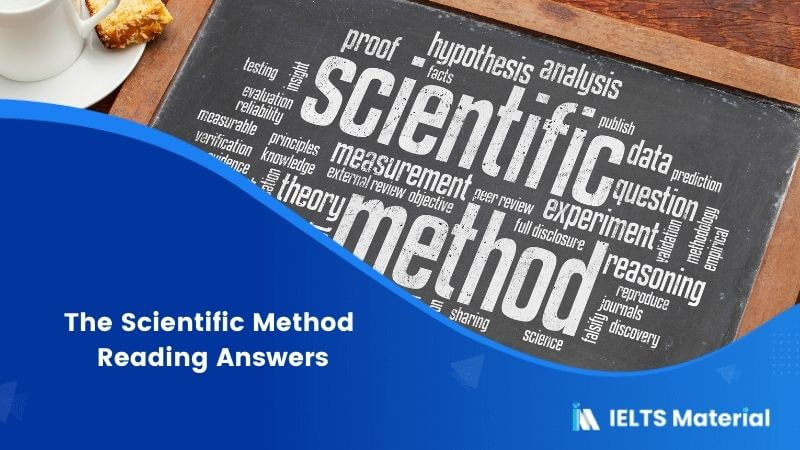



Post your Comments